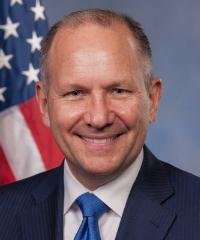
Lloyd Smucker wants to reignite the American Dream. He believes this can be achieved by working to increase economic opportunity for everyone, reining in Washington’s out-of-control spending, and providing regulatory relief to small businesses so they can expand and create jobs.
Prior to being elected to Congress, Rep. Smucker owned and operated the Smucker Company for 25 years, and grew the small business to eventually employ more than 150 people.
He served two terms in the Pennsylvania State Senate where he chaired the Committee on Education. In that capacity, he pioneered reforms to increase accountability in education spending and worked to ensure Pennsylvania students had access to quality education. Rep. Smucker led the charge to hold elected officials accountable by proposing reforms to the ethics guidelines. As a member of the Appropriations Committee, he made it a priority to rein in spending and built a reputation as an independent-minded conservative who seeks creative solutions to complex problems.
The opioid crisis is wreaking havoc on families and communities all across Pennsylvania and America. Hundreds of thousands of American lives have been cut short by prescription drug abuse. That is why House Republicans have made combating this crisis a top priority. Read more at opioidcrisis.gop.
1. Treatment and Recovery
2. Prevention
3. Protecting Communities
4. Fighting Fentanyl
Find out what Congress is doing to combat the opioid epidemic by visiting opioidcrisis.gop or text CRISIS to 50589.
Substance Abuse and Mental Health Services Administration National Helpline
SAMHSA's National Helpline is a free, confidential, 24/7, 365-day-a-year treatment referral and information service (in English and Spanish) for individuals and families facing mental health and/or substance use disorders.
Contact: 1-800-662-HELP (4357) and online at www.samhsa.gov/find-help
Commonwealth of Pennsylvania Resources
There are a number of ways to find treatment for those suffering from the disease of addiction. Pennsylvania's hotline is completely confidential and can provide information about treatment resources. It is staffed by trained professionals, is available 24 hours a day, seven days a week, and is available in both English and Spanish.
Contact: www.pa.gov/guides/opioid-epidemic and the SAMHSA Helpline at 1-800-662-HELP (4357)
You can also find treatment by reaching out to a Center of Excellence. Centers of Excellence help ensure that people with opioid-related substance use disorders stay engaged in treatment to receive follow-up care and are supported within their communities.
Lancaster County Center of Excellence
Lancaster General Hospital
717-544-1427
Chester County Center of Excellence
Center for Integrative Medicine
610-583-3800
Berks County Center of Excellence
Reading Hospital and Health System
484-628-8070 (option 2)
Introduced by Reps. Smucker and Betty McCollum, the bipartisan Community Action Opioid Response Act authorizes $250 million in federal funding over five years to help communities respond to the needs of low-income families and those in crisis because of the opioid epidemic.
The bill establishes a competitive grant program to expand and support effective community efforts to identify and respond to the causes and consequences of opioid misuse and addiction experienced by low-income individuals, families, and communities. Uniquely positioned to address these needs, Community Action Agencies would compete for three-year grants ranging from $50,000 to $1 million per year.
Learn more about the Community Action Opioid Response Act here.
Rep. Smucker urged President Trump's administration to reject spending cuts to the Office of the National Drug Control Policy (ONDCP) in order to continue the fight against the opioid epidemic. In a letter to Office of Management and Budget (OMB) Director Mick Mulvaney, Rep. Smucker said:
"Now more than ever our nation must prioritize federal funding to combat rampant drug abuse. As you are aware, the Centers for Disease Control and Prevention reports that, in 2015, opioids were involved in the death of 33,091 Americans - more than double the rate in 2000. The opioid epidemic is tragically engulfing the Commonwealth of Pennsylvania and has claimed the lives of more than 3,383 of our constituents in 2015. We must increase the federal government's response in the wake of this public health crisis."